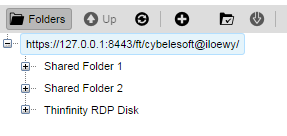In order to exchange files with the remote machine, Thinfinity® Remote Desktop Server maps disk drives on the connection, so that users can manipulate their files remotely and exchange them with the local machine.
You can find the mapped drives on the connection's Windows Explorer.

Thinfinity® Remote Desktop Server maps two kinds of directories:
Intermediate disks
The intermediate disks are directories created by Thinfinity® Remote Desktop Server and they are user exclusive, which means that the files saved on this directory won't be accessible by other users.
If you are establishing connections through Profiles, you would have to ask to the system administrator what is the name of the profile intermediate disk. Otherwise, if you are configuring the connection settings yourself, you will be able to set your own drive name.
Be cautious: The files will be deleted right after you close the connection, if you log into Thinfinity® Remote Desktop Server as an "anonymous user".
Shared Folders
The Shared Folders are network directories accessible by all Thinfinity® Remote Desktop Server users and connections.
Besides the file transfer utility, they are also useful to exchange files with other users.
The name of the Shared Folder drives are defined by the System Administrator. Find out what is the name of the Shared Folders, so that you can use them to manipulate your remote files, perform file transfers and exchange files with other users.
The "Intermediate disks" and "Shared Folders" will be the only remote locations available on the File Transfer Manager.
If you need to download or upload remote files you should always move them first into these directories (they are going to be mapped drives also), and after that transfer to the desired location.
Read more: